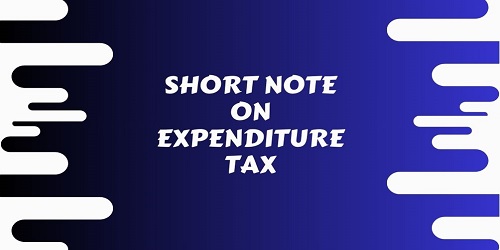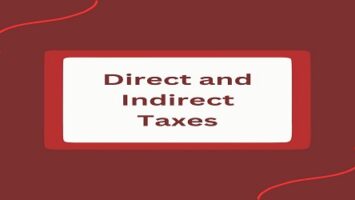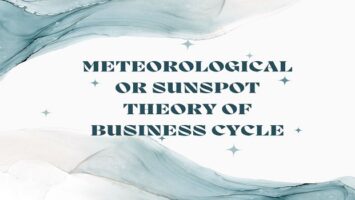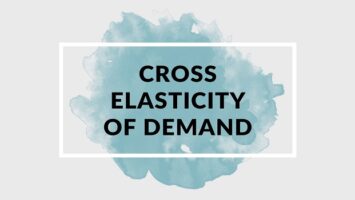Table of Contents
Expenditure Tax:
Though income has been regarded as the most suitable index of a person’s economic welfare, expenditure is also considered an alternative to income as the basis for taxation. Hobbes, a 17th-century economist, also believed in taxing people in accordance with what they consume on the grounds of equity. Similarly, John Stuart Mill argued for an expenditure tax in 1861 before a Select Committee rather than a tax on income and property tax. Marshall, Pigou, and Fisher all believed that expenditure tax is a good direct tax. However, expenditure tax has always been considered a good tax in principle, but it has not been regarded as a good tax from the point of view of administrative efficiency.
Determination of Expenditure:
It is a direct tax to be levied on persons with reference to the amount of consumption expenditure. It can be adjusted to the individual circumstances of the taxpayers and can be made progressive. According to Prof. Kaldor, expenditure can be ascertained indirectly ad the difference between money incomings and outgoings. The cash incomings include the opening cash and the bank balances., regular incomes, receipts from gifts, inheritances and fresh borrowing, etc. Cash outgoings include loans made to others, payment of borrowings to others, money paid in purchasing capital assets, cash, and bank balance at the end of the year. The total of the latter may be deducted from that of the former. The balance would constitute personal consumption expenditure for the period, on which the tax may be levied. Thus, the tax base is consumption expenditure, defined as “The difference between a family’s income and the increase in net wealth during the year.”
Expenditure Tax and Ability to Pay:
Prof. Kaldor does not consider it wise to rely upon a person’s income as a measure of his tax-paying capacity. Similarly, other supporters of the expenditure tax question the so-called advantages of income as the measure of individual tax-paying capacity. Kaldor, however, believes that what a person actually spends is a better measure of his tax-paying capacity. He argues that income for purpose of taxation is not a well-defined concept, as different persons with different sources of income are treated differently even though their spending power may be equal. For example, an agriculturist with a net income of Rs. 40,000/-does not pay any income tax in India, while an office employee is subject to income tax if his net income exceeds Rs. 40,000. Hence, according to Prof. Kaldor, a person’s expenditure is a better measure of tax-paying capacity than income. Besides, a specified amount of consumption expenditure can be exempted; and the tax can be proportional or progressive.
Expenditure Tax and Incentive:
Expenditure Tax has been defended on the ground that it has fewer adverse effects on incentives to save work and risk bearing than the income tax. In fact, income tax discourages savings and investment, and interest on savings and profits from investments are again subject to taxation. It is because of this reason that certain exemptions are granted to savings from income tax, to reduce the adverse effect of income tax, on the other hand, expenditure tax, on spending, encourages savings. Again a substantial part of profits earned by an individual through his investment and enterprise is taken away by way of taxation, but in case of losses, he is not compensated. Hence, income tax, especially a steeply graduated tax has adverse effects on savings and enterprise. While an expenditure tax does not have such adverse effects, as it is a tax on personal spending and on interests and profits. Similarly, expenditure tax does effect adversely the willingness of an individual to work more.
Effects on Consumption:
Expenditure Tax has also been defended on the ground that the richer a person is, the less does his expenditure confirm to and can prove more useful as an instrument for reducing consumption inequalities than income tax. To put it in the words of Prof. Prest who has been a critic of this tax, “If we are judging the two taxes (income and spending taxes) as methods of securing greater equality of consumption, the expenditure tax carries with it, whether like it or not, the potentiality of greater equalization of consumption over-time as well as between any two individuals or groups of individuals at any one time. Thus, expenditure tax on the luxurious and wasteful expenditures of the richer classes encourages savings and investment. It, therefore, directs wasteful expenditure into channels that have greater social usefulness.
Principles of Equity and Expenditure Tax:
Prof. Kaldor justifies the tax from the point of view of ‘fairness’ and ‘equity’. He was of the view that expenditure tax is superior to income tax, as “an expenditure tax would not tax people on the basis of what they contribute to the common pool but according to what they take out of it.”
In his opinion, an individual imposes more burden on the community by spending and not by earning, or saving. Therefore, the luxurious waste of private men-showed be taxed and not the praiseworthy activities of working, earning, saving, and risk-taking. Similarly, Hobbes also considers expenditure tax superior to income tax as far as consumption is concerned. We, however, believe that it may satisfy the principle of equity to a reasonable degree of significance if levied in a progressive manner.
Expenditure Tax and Tax Evasion:
There are always some loopholes under the system of income tax, and therefore, people make an effort to escape from the tax. Under steeply graduated income tax, wasteful expenditure on advertisement, entertainment, etc., is also encouraged to avoid higher tax rates. For example, if a businessman is paying 80% of his income in tax in the higher slab, naturally, he would like to spend his income on such items in order to take complete benefit of it instead of paying 80% of it by way of taxes. However, this can be avoided, according to Prof. Kaldor, if there is an integrated scheme of taxation, in which there is an income tax that is not very sharply progressive, and expenditure tax and an annual capital tax, a tax on capital gains, and a tax on gifts.
Controls Inflationary Trends:
In terms of inflationary and rising prices, it is very much required to curtail expenditure and encourage saving, an expenditure tax will not reduce spending but may penalize even. Hence, expenditure tax may be justified during a period of inflation as it checks consumption and controls prices. But, during the period of deflation an expenditure tax may have adverse effects, as a check on consumption may retard investment, and thus may result in further retrenchment and unemployment. Thus, it is one of the significant arguments against the use of expenditure tax.
Finally, the tax may be considered a good tax especially for developing economies as it stimulates saving and capital formation and does not have adverse effects on investment.
Justification for Expenditure Tax:
This tax was recommended by Prof. Nicholas Kaldor in 1956 to be imposed in India. He also suggested the substitution of expenditure tax in place of income tax for the following reasons:
(1) Income tax can be evaded in many ways as many property transactions are not recorded.
(2) The definition of the income tax base is vague and arbitrary. Income is not a correct measure of taxable capacity. A person with a salary income of Rs. 10,000 a year does not have the same spending power as of one with the same income from the property.
(3) The effect of a steeply graduated income tax system on saving and investment is adverse in fact, highly progressive direct taxation on incomes may lead to dis-savings.
(4) The effects of a steeply graduated income tax system on the supply of enterprises in risk-bearing activities are more adverse than expenditure tax.









Comments (No)